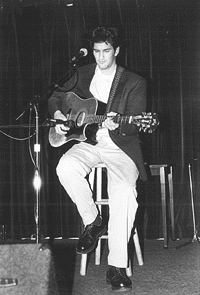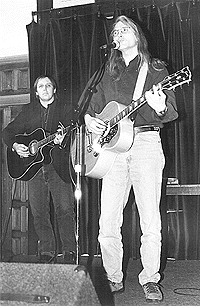https://www.austinchronicle.com/music/1997-01-31/527297/
Live Shots
January 31, 1997, Music
THE GRASSY KNOLL, HOLLOWBODY
Liberty Lunch, January 18
 J.T. Van Zandt at the Cactus Cafe, January 22nd tribute to Townes Van Zandt |
40-minute opening set, a loose amalgam of everything New Wave and Eighties (on the English side of the street), highlighted by the song title of the evening, "Hotwheel Named Desire," didn't really need a third guitarist with Adam Sultan and Ted Cho doing fine on their own. But what the hell, you know? It's not everyday you're in the position of letting your former bandmates open your roadshow. Nevertheless, Green didn't make an appearance until an hour later when he and his three bandmates walked onto the near-barren stage amidst the haze from the smoke machine. Taking their places, Green and company immediately locked into the drummer's James Brown funk beat (made famous by John Bonham and later the Beastie Boys) and found their hypnotizing groove. Unfortunately, 30 minutes later, it sounded exactly the same -- like the mid-section of a Sister 7 show at Steamboat. Green was inconspicuous in the shadows and so was his guitar playing. Meanwhile, trumpet player Chris Grady, front and center at the mike, laid down some post-Bitches Brew blowing that proved to be the focal point of the evening. And maybe that was the point. Still, it was something of a shock when 45 minutes into the one-hour set, Green and his wah-wah pedal finally took charge, bursting into a metal storm that continued into the Satrianic meltdown of an encore. One expects more of this if Green and his Grassy Knoll make the trip to South by Southwest this year. -- Raoul Hernandez
LOS TIGRES GUAPOS
Flamingo Cantina,
January 21
 Jimmie Dale Gilmore at the Cactus Cafe, January 22nd tribute to Townes Van Zandt |
b-side, of course). As far as I'm concerned, the world needs more bands like this: bands illustrating that punk is not just another quick-to-rise and quick-to-pass facet of the new and fickle world of popular-alternative music; it's a fucking institution. It won't and shouldn't go away. The only thing is, with songs this short, it's difficult to get a grasp on them; before you get a handle on it, it's over. And even though the next one will be much the same, you still want them to finish the last one. Oh, for the three-minute anthem! -- Christopher Hess
HANDFUL, THE SHINDIGS, HALFWATT
Electric Lounge, January 23
 Danny Silverman & Mickey White at the Cactus Cafe, January 22nd tribute to Townes Van Zandt |
COUNTING CROWS, FIONA APPLE
City Coliseum, January 24
Finding the appeal of Counting Crows is simple once you find to whom they appeal. These are guesses, but looking around the audience at Friday's sold-out Coliseum show, it's people whose most pressing concerns are probably of the 30-year-old variety; whether its finding time to finish the quarterly reports so as not to cancel the ski trip, or -- for the slightly younger set -- whether their parents should buy them a brand new sport utility vehicle instead of handing down the '92 Accord. Who else can afford to offer $100 for a scalped ticket? These people need real drama in their lives and the Crows have it in abundance. Be it the overdone bad poetry of "Goodnight Elisabeth" ("If you wrap yourself in daffodils/I will wrap myself in pain") or the blatant pathos in the otherwise cryptic "Recovering the Satellites" ("We're so fucked up, you and me"), for 90 minutes your disappointments are amplified and put to music on stage. You get to feel like Willie Loman, Blanche Dubois, or the Shakespeare character of your choice, and your life takes on the tragic proportions you want it to have. As long as the music plays, it works. There really isn't a question of believability because the band isn't acting nor selling an image. Singer Adam Duritz doesn't have Michael Stipe's "I'm-bigger-than-the-world" pretension, nor does he have Eddie Vedder's "I'm-gonna-hide-up-here-on-this-stage" reluctance. He has a little bit of charisma and the rest of the band is faceless; and they've written some better-than-average pop songs. And that's what they give. Then it's over. It's entertaining and unremarkable. Opener Fiona Apple needs to grow up first physically, because it felt rather felonious to watch someone looking under the age of consent undulate sexually with the mike stand. Some emotional growth would be welcome too, because, there's no need to torment an audience with the handful of songs about every teenage loser (redundant) you've ever dated. Even if she never matures, she's going to be huge because you can make it on looks alone (see Jewel) and there's an endless supply of 17-year-old girls who continually exercise bad judgment when it comes to boys, and have extra baby-sitting money to spend. -- Michael Bertin
TA ME'RE
Gingerman Pub, January 26
The term "jazz" was originally used to denote a copulatory act; it was only later in the Twenties that it was applied to a renegade style of music that placed heavy emphasis on individual improvisation. When the term "Latin" is added to jazz, the reference is not only to a unique approach to playing, but also to a particular feeling evoked, in part, by certain instruments such as a gut-string guitar and syncopated percussion. Too often, however, Latin jazz is grouped together with the term "cool jazz." Originally used to describe a slow, West Coast jazz genre that grew in reaction to the faster, East Coast be-bop sounds, the term cool jazz now refers to a weak sound that even at its best is just this side of Muzak. Latin jazz (in this sense) is anything but cool; played well, it's as hot and spicy as endorphin-inducing fiery salsa. Back in the early Sixties, "that Brazilian thing" (as Cannonball Adderley called it) was taking the jazz world by storm, and it's not hard to see why: A key element in jazz is a strong, moving rhythm, and by simply adding Latin timing and percussion, it gave the idiom a new type of swing. While not as hot or full of fireworks as some of the best in the field (Grupo Folklorico is a good example), Ta Me're -- comprising a bassist, two guitarists, a percussionist, a trumpet, and a cameo cornet -- play a mellifluous brand of Latin-flavored jazz music that makes you want to move your hips in glee. I blame the percussionist; he was excellent in his role as time keeper and added tasteful flavorings to each tune. The gut string and electric guitar complemented each other in fine style and the whole band was well-supported by a steady bass line. The horns (while somewhat tentative at times) floated well over the other instruments. When Ta Me're started playing, out back of the Gingerman, the number of people off stage was just slightly more than those on. At the end of their first set, however, there was a substantial crowd of listeners who enjoyed the graceful and flowing sounds of the band. Duke Ellington said, "It don't mean a thing if it ain't got that swing," and swing they did. Keep an ear out for Ta Me're. -- David Lynch
Copyright © 2024 Austin Chronicle Corporation. All rights reserved.
